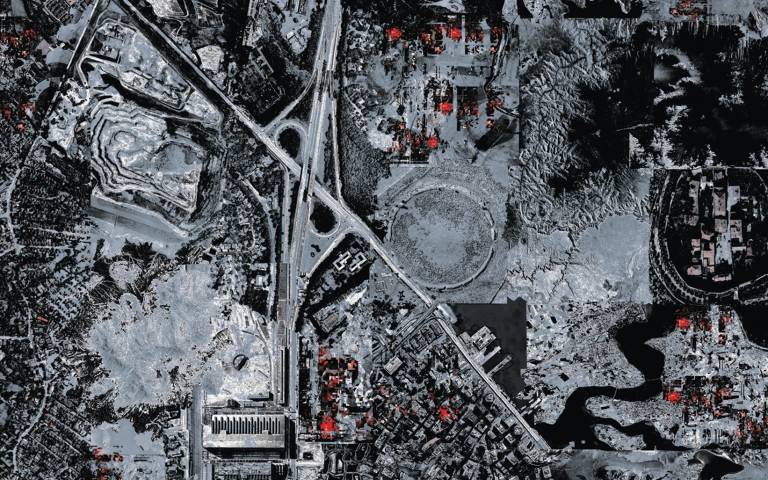B-Pro Prospectives Lecture Series Autumn 2021
24 November 2021–09 December 2021, 2:00 pm–7:00 pm

A B-Pro History and Theory lecture series, highly recommended for Architectural Design, Urban Design and Architectural Computation students as well as interested professionals.
This event is free.
Event Information
Open to
- All
Availability
- Yes
Cost
- Free
Organiser
-
Roberto Bottazzi
About
The B-Pro Prospectives History and Theory Lecture Series offers a platform for presentation, discussion and theoretical reflection upon the links between digital thought, architecture, and urban design. This year's series of talks emphasise the key role computation plays within complex design synthesis and their cultural implications.
This series encourages and inspires the current student body and interested professionals, by creating conversations about topics addressing academia, practice and beyond as well as overall disciplinary concerns and frontiers.
B-Pro, or Bartlett Prospective, groups together five of the school's graduate programmes with a unique philosophy and shared approach to the future of design, architecture and the urban environment. The B-Pro Prospectives lecture series is organised by Roberto Bottazzi and Emmanouil Zaroukas.
For this term's series, all events will be held in Zoom. Check the schedule for individual registration links to each event.
Schedule
- 24 November | 14:00 | Emmanuelle Chiappone-Piriou
Writing for Friends, Speaking Together: of the World, Codes and Interpretation
The concern for the manners in which to accommodate collectives, composed of multiple life forms and fleshes, imposes itself as a pressing issue today, one to which architecture too is called upon to respond (How will we live together? asks the current Venice Biennale). Modernity had placed quantity and great numbers at the heart of its intellectual and political project, as manners to attend to the “quantity of life that is produced ,or is dissipated, or is consumed in the mass” of the cities (Paul Valery). The contemporary appears largely governed by quantification, its landscapes and models forged and nourished by the phantasm of a world given through data (datum).
This lecture will attend to such processes through the prism of logos, code and interpretation, articulating episodes, artefacts and notions taken from architecture history, philosophy, poetry and art. How can we think of collective inhabitation of the world, with regard to the myriads of (architectonic, non-anthropocentric) manners of “speaking together” (Hannah Arendt) about it?
Biography
Emmanuelle Chiappone-Piriou works as an independent author and curator. Her research and projects focus on the frictions between architecture, art and computation; they develop at the crossroad of artistic and academic settings and manifest as exhibitions, texts, workshops, talks and performances. In 2020, Emmanuelle curated Supestudio Migrazioni at the CIVA, and edited the eponymous book. Emmanuelle has collaborated to numerous exhibitions in the institutional context, notably at the Centre Pompidou, and at the Barbican, as part of the OMA Progress team (2011). Between 2011 and 2016, she acted as the Program Curator at the Frac Centre, where she co-curated Reliefs (2015), The City as a Vision (2014-15), and coordinated Naturalizing Architecture (2013). She is currently a member of the Cité de l’Architecture et du Patrimoine scientific council. Trained as an architect and architecture historian, Emmanuelle is pursuing her PhD at the Architecture Theory and Philosophy of Technics ATTP department at TU Wien; she is an external lecturer at the university, as well as in ENSA Paris Malaquais.
- 9 December | 18:00 | Kyle Steinfeld
Artificial Relief
Periods of technological change often bring into stark relief the dynamic between the inherent affordances of design tools and the perceived autonomies of design practice. As machine learning (ML) processes are introduced into computer-aided architectural design, we can expect that the specific modes of action afforded by this new media will catalyze certain changes in the way we design. What novel subjectivities might we embrace, and what fresh liberties does this new medium engender? Conversely, which of these new capacities should designers avoid, and what are the important domains of action that are denied? This talk considers the affordances of neural networks in creative practice. It is motivated by the detailing of a number of completed projects and experiments, and culminates with an in-depth discussion of the "Artificial Relief" project that was developed for the 2021 Venice Biennale.
Biography
Kyle Steinfeld is an architect who works with code and lives in Oakland. Through a hybrid practice of creative work, scholarly research, and software development, he reveals overlooked capacities of computational design; finding no disharmony between the rational and whimsical, the analytical and uncanny, the lucid and bizarre. His work is expressed through a combination of visual and spatial material. Through these, he seeks an undermining of the imperative voice so often bestowed upon the results of computational processes, and to express in its place a range of alternative voice.
Please note this event is rearranged from 1 December to 9 December.
Image: Compressed Landscape, from 'Beyond the Grid: Territories of Resolution', by Carolina Safieddine, Jiahua Dong, Kun Luo and Yandong Liu, Urban Design MArch, RC19, 2021
 Close
Close

